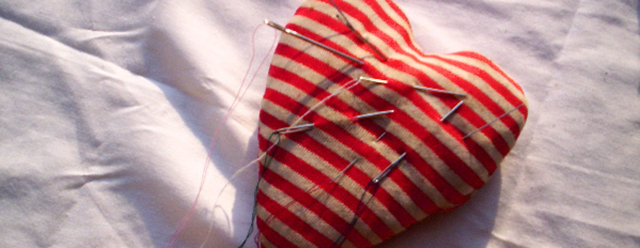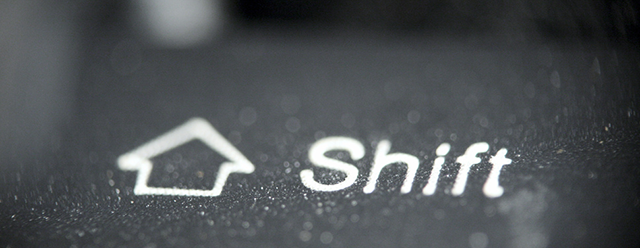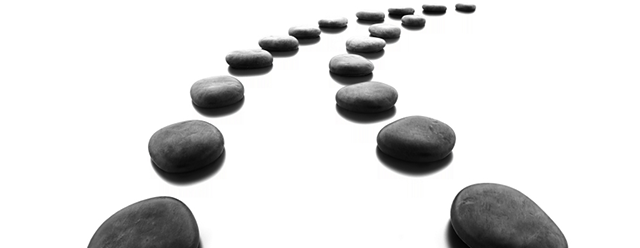
by Tara Joyce | Nov 11, 2014 | Cultural Creativity

If the pain is going to be there either way, why would I choose to feel it?
If I feel it, I can actually heal it. If I don’t feel it, I can not know its true state, and I can not start to heal it.
Whether I like it or not, feeling my pain fully is necessary for my healing, for my whole-ing.
I can not reduce my pain when I don’t acknowledge it. I can not feel more whole and healed when I deny parts of my experience.
When I want to hide from my pain, I remember that in facing it, I start to heal it. Stuffing it down only guarantees I will hold onto these feelings longer.
My pain is inevitable but my suffering is optional.
So I practice feeling it and not fearing it. I practice believing I can face and handle my pain. And ever single time I do, I find I’m right.
photo credit: Lein C. Lau

by Tara Joyce | Nov 5, 2014 | Cultural Creativity, Self/Business Growth

It’s right. It’s wrong.
It’s neither.
It’s just an option. It’s just one way of doing things. It simply one way to approach something.
Take it and/or leave it.
It may be what I’ve done, and it may be what I’m doing, and it may be working for me, but it is still only one way of doing things.
Nothing more.
Take it and/or leave it. Be interested and/or think it’s bunk.
In the end, it’s simply what works for me, for now.
Nothing more.
The approach I am choosing is no more right or wrong than any other approach.
Take it and/or leave it.
Maybe my approach will work for you. Maybe it won’t. I can’t say for sure.
You know what’s best for you.
Take it and/or leave it. Be interested and/or think it’s bunk.
I am here, sharing my perspective on my experiences. And you are there, deciding what to do with them. You decide how much truth my perspective holds for you. You decide how much you’re learning.
It’s not about right or wrong. There’s no place for that here. In this space, it’s about possibility.
What’s possible for you?
photo credit: Dan Foy

by Tara Joyce | Oct 27, 2014 | Cultural Creativity, Pay What It's Worth Pricing

I like to think about money as an idea in the form of credit. To get in the money game, I need to build up my credit. To build up my credit, I need to work on my inner and outer relationship with my self and money.
My Outer Credit Work:
- identifying & communicating the value I offer (marketing my self and my business)
- growing my wealth (creating opportunities for higher pay and more abundance)
- caring for my wealth (managing my money and my self)
My Inner Credit Work:
- connecting with the value I offer and the abundance of wealth I possess (transforming my thoughts, feelings, beliefs, attitudes, and actions about money and my self)
As I practice with Pay What It’s Worth and not setting prices, I’m noticing the system naturally supports me in doing my inner and outer work. It supports me in clearly identifying where I still have work to do in improving the quality of my thoughts about my self and money. When I feel something isn’t working in my business and/or in an exchange with my customer, I have an opportunity for inner work and outer work. My business is a mirror for my relationship with my self and money, and my customer is a powerful guide in showing me what is working in this relationship, and what is not. My customer’s feedback and behaviour in our business exchange, and my satisfaction with it, highlights where my thoughts and actions are adding value and where they are not. How am I building my credit? How am I taking from it? If I don’t feel fairly valued, I explore how I am creating this imbalance in my relationship and I work to correct it.
Psychology is to money what an engine is to a car, and my motives, my drivers to action, determine my results. My thoughts about money determine where I go with it, the quality of my ride and my response, and how fast I travel. If I want to live and love abundantly, I must be working on thinking abundantly. As I work at increasing the quality of my thoughts, and in turn my actions, my wealth increases. As I learn to value my Self and how I am of service more wholly, my customer naturally does too. This is the work and the reward of building my credit.
photo credit: Matt Jiggens

by Tara Joyce | Oct 8, 2014 | Cultural Creativity

I make a difference by being what I am. I add value to my world by being the light I am, and by holding onto this light no matter what externally arrives to me.
To do this, I need to protect myself from the overwhelm of the external world. I need to protect who I truly am. I can not lose myself; and it’s important I acknowledge the force by which others may seem to want me to. I need ways to deal with the tension between taking care of my inner business and taking care of external affairs.
As a child, it could be hard to know what was right — the authority figure who wanted me to change, or the inner guru who knew I was as I needed to be. It was hard to know what defined my needs. Now as I grow, I am learning to better understand the contrast between my truth and the manufactured needs that keep me from it.
My truth is in my inner directive. My wisdom lies in staying connected to myself while pushing into the world. In holding my sense of self I have what I need to sense my way forward with confidence.

by Tara Joyce | Sep 30, 2014 | Cultural Creativity

We don’t really have a problem with peoples imperfections. We don’t really hate the dark aspects we each contain. It feels like we do, but our feelings can be misleading sometimes.
It’s easy to point out and judge another for the things that aren’t perfect about them. If you decide to take on this job, your list will easily become a mile long. We are not perfect, and you’re always going to be able to find evidence to back this truth up. No matter the person.
What you really have a problem with, when you find yourself angered by another and their imperfections become so glaringly obvious to you, is the lack of responsibility you feel that person has over them. Your pissed because they are not being aware of the dark things about themselves and their behaviour, and how it affects you. You feel they are not being responsible in their doing.
If I was to own my darkness and be up front and responsible for the ways in which I am imperfect and how they affect you, how would that change your anger towards me, and towards the imperfections I hold? In my experience, you no longer mind my imperfections so much, nor judge them so harshly, because I am aware of them and responsible to them. It wasn’t my darkness that was getting you, it was my lack of responsibility towards it.
If I own my stuff, if I am aware and shine a light on my darkness and admit my contributions, you may be left with some anger towards my actions, but in owning my part I’ve created the space for you to own yours and/or move on. In being responsible for my imperfections, I’m not in conflict with you over them. I am free to admit what I did and who I am.
When I own my darkness, does it not make it harder for you to hate and blame me for it?
photo credit: Sergio García Moratilla










